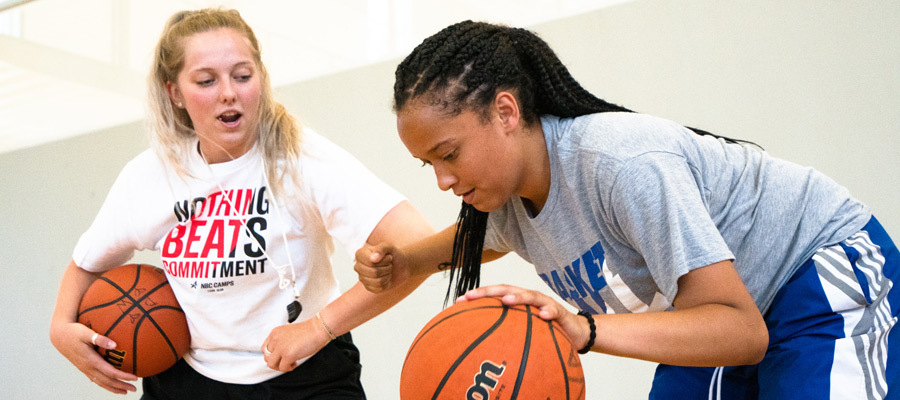November 11, 2019 | Tagged Skills,
5 Keys to Creating Successful Routines

“You’ll never change your life until you change something you do daily. The secret of your success is found in your daily routine.” John C. Maxwell
Fall is here and with it comes the upcoming basketball season. As nature prepares for the changes fall brings, now is a good time to reflect on our daily routines. The value of routine allows you respite from decision fatigue. For many students, the spontaneity of summer is one of the great benefits of this time of life. You can afford to watch the late night movie, you don’t have to read this book right now, you can wake up in daylight.
As fall and winter approach, life expectations become higher. You are expected to be on time for school, to read this book by this due date, to get up in the dark to work out. As obligations and time requirements increase, the quality of your routine becomes crucial for success. Routines help you to streamline your day, achieve more and maintain bandwidth for decisions that matter most.
Set aside some time to review your routines and make ones that will sustain you through the challenges of the upcoming school year and basketball season.
5 Keys to Creating Successful Routines
a. The routine must be yours – heart, mind and soul. If the routine is implemented upon you without your buy-in, you will struggle with apathy and bitterness. Love, gratitude and enthusiasm need to be the bedrock of your routine. Obligation and duty are the secondary not primary motivators. When obligation becomes primary, the heart dies and all else dies with it.
b. Be wise on what the routine is working to protect or build. A “protective routine” is working to create space for silence, rest, discernment, prayer, and rejuvenation. If you are in a highly scheduled school and workout schedule, you must build a routine for rest and recuperation.
A “building routine” is created to increase your skill or ability in a certain direction on a daily basis. This “building routine” operates from the principle that small daily discipline that is intensive and consistent is better than longer more sporadic training times.
c. Know yourself. When is your most productive time of day? When is your least productive? Where are the areas you struggle? What can you implement to help you through your challenges? Learn from what has not worked in the past and learn what has worked. Take the lessons you have learned and create new plans. Doing the same routine without discernment is folly. Find the flaw in the design and try again.
d. Get outside accountability to help you kick start your areas of weakness. If you struggle every year to be in shape for basketball season, get with an accountability group and stick to this plan.
The routine of going to a workout will help you more than trying to muster the willpower to work hard enough when you are by yourself.
e. Simplify. Less is more.
“Downtime replenishes the brain’s stores of attention and motivation, encourages productivity, and creativity, and is essential to both achieve our highest levels of performance and simply form stable memories in everyday life. A wandering mind unsticks us in time so that we can learn from the past and plan for the future. Moments of respite may even be necessary to keep one’s moral compass in working order and maintain a sense of self.” -- Scientific American
Reasons why routines fail:
a. Burn out -- they are too difficult to maintain. The routine is too complex or too over-scheduled and can’t be sustained. You only created a building routine and you didn’t create a recuperation routine.
b. Injury or setback—something happens and you have to step out of your routine because of an injury or difficulty.
c. Decision fatigue—as you get more tired and head toward the end of your day, your decision making loses its power. You will be more likely to eat fast food in the evening instead of eating something healthy, you will end up watching TV instead of finishing your project. This issue is fatigue. You don’t have enough margin and you have waited until you are tired to make your decision.
d. Unprepared for the cognitive overload—there are some tasks that leave you really exhausted and some that leave you energized. Each task is not the same and each person’s response to a task is not the same. For example, a student learning to drive must exert much more cognitive work driving than someone who has been driving for many years. Many people never evaluate the cognitive pressure they will encounter. Prepping for a final exam is much more pressure than reading a book. People fail to account for how much cognitive overload their tasks are taking on them.
e. FOMO (Fear Of Missing Out) or Ego Overload—we want to achieve more than others so we set our routines based on the “Jones” instead of the mission and purpose of our life. If you are living in comparison instead of being generated from your own life call, your actions will be empty. An ego driven life is a soulless life.
About NBC Basketball
NBC Basketball began in 1971 and is built on the mission to help athletes become stronger, wiser and better players and leaders. NBC Basketball has training camps and programs in 6 countries. Camps emphasize the importance of hard work, talent development, leadership, faith, mental toughness and the intrinsic qualities necessary for success. Find out more at www.nbccamps.com/basketball.